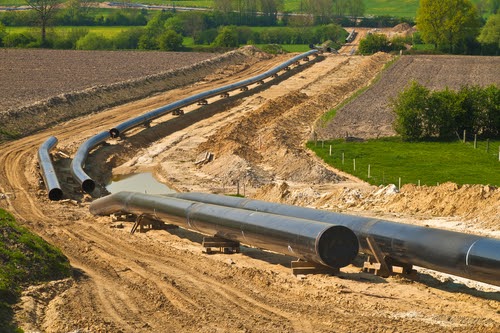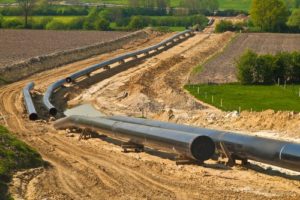
HARRISBURG, PA (February 22, 2023) – Today, the Pennsylvania Supreme Court handed down a major decision in two suits where the public sought reimbursement for legal costs in environmental cases: the Clean Air Council, the Delaware Riverkeeper Network, and Mountain Watershed Association v. DEP and Sunoco Pipeline and Gerhart v. DEP and Sunoco Pipeline cases.
The Supreme Court’s decision reversed a lower court ruling that had put up a major barrier to reimbursement of legal costs for environmental lawsuits brought by non-profits and residents. Now, members of the public, who are harmed by permits allowing industrial activities, and who successfully appeal those permits, are more easily able to get reimbursement of their legal costs. The reimbursement can come not only from the state, who issued the permit, but from the company holding the permits, and profiting from the permitted activity. Legal experts, fees, and other costs necessary for these cases can easily reach tens or hundreds of thousands of dollars, and the cases can go on for years or even decades, making appeals like this out of reach for most absent the ability to recoup costs.
The decision is a victory for the environmental organizations, who had sought but been denied reimbursement for their legal costs from Sunoco Pipeline, the builder of the controversial Mariner East pipelines. It is also a victory for the Gerhart family, landowners along the pipeline route who stood up to the company and also had success at the Pennsylvania Environmental Hearing Board.
“Today’s ruling from the Pennsylvania Supreme Court is a huge win for the public,” said Joseph Minott, Executive Director and Chief Counsel of Clean Air Council. “Too often, when members of the public have been harmed by big polluters, they are unable to afford legal support. Today’s ruling makes it easier for the public to be compensated for their legal costs when their lawsuits are successful. This opens the door for the public to finally have their day in court and for justice to be restored.”
Melissa Marshall, Community Advocate with the Mountain Watershed Association stated, “We are pleased with the decision for two reasons. Not only does it remedy a bad standard, but it also clarifies, for the first time, that it is the permittees – often exploitative industries, such as mining and fracking — and not just the taxpayers, who should bear the financial burden when environmental groups bring protective lawsuits.”
“Today’s decision appropriately recognizes the significant role that citizen objectors play in the vindication of environmental rights and the General Assembly’s laws protecting the public natural resources. This ruling helps support legal action against bad permitting decisions, and holds accountable the parties who stand to benefit financially from those decisions,” said Kacy Manahan, Senior Attorney for the Delaware Riverkeeper Network.
“Today’s opinion shows that Pennsylvanians who enforce the Clean Streams Law have a voice and that applicants who submit faulty permit applications to DEP can be held responsible for their sloppy or incompetent work,” said Rich Raiders, attorney for Stephen and Ellen Gerhart, Huntingdon County landowners who won a fee award from DEP, but not Sunoco, in a case decided with the Clean Air Council matter in today’s opinion. The Gerharts successfully challenged a wetlands determination on their Huntingdon County property where Sunoco was required to remediate a parcel of forested wetland disturbed during construction.
In March of 2022, Clean Air Council, Mountain Watershed Association, and the Delaware Riverkeeper Network petitioned the Pennsylvania Supreme Court to overturn that lower court decision, which made it nearly impossible for residents or advocacy organizations to be compensated for their legal expenses from the permit holder when appealing a DEP permit. The Commonwealth Court decision affirmed the Environmental Hearing Board’s decision that denied the groups’ request for Energy Transfer (Sunoco Pipeline’s parent) to compensate parties for their legal fees stemming from an appeal of Sunoco’s Mariner East 2 pipeline permits.
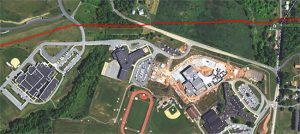
Chester County, PA (August 16, 2022) — Highly volatile hazardous liquids surge through the Mariner East pipeline system as it snakes through over 300 miles of Pennsylvania’s land. It passes by schools, under farms, and across streams. Existing lax regulations could not prevent Sunoco Pipeline L.P.’s reckless construction practices from creating sinkholes by homes and train tracks and contaminating residential water supplies, nor make Sunoco provide basic safety information to schools and communities in the zones threatened by potentially catastrophic leaks or explosions.
The Council, other local health and environmental groups, and impacted residents have worked tirelessly for years to protect the public and hold Sunoco accountable. We now applaud the Public Utility Commission (PUC) for stepping up with proposed common-sense rules to reduce the threat from hazardous liquid pipelines. Sunoco and other industry actors are trying to block the PUC’s proposed safety regulations, but the Council is meeting them at every turn, fighting Sunoco in court when local communities sue for relief, amplifying the voices of the public, and supporting the PUC’s invaluable efforts.
One of the most important proposed regulations would help prevent sinkholes and potential pipeline ruptures by requiring pipeline builders to look at the geology of a site before starting construction. Pennsylvania’s unique geology includes unstable limestone formations, called karst. These pipelines carry volatile gasses that are compressed under great pressure into liquid. If the pipelines rupture, heavier-than-air gasses would rapidly blanket the surrounding area, potentially suffocating anyone in range, and the slightest spark could ignite the highly flammable gasses. So, it seems obvious to avoid building where the ground might crumble away, leaving the pipeline unsupported. Yet Sunoco historically neglected to adequately check its construction sites, too often with disastrous results, and now fights this necessary rule.
The PUC also wants to require pipeline operators to provide local officials and emergency responders with the information they need to protect their communities in the event of an accident. The Council strongly supports providing all the information needed to local officials charged with protecting schools in the potential impact zone of a pipeline leak or other accidents. Previously, Sunoco provided such limited information to local community members that it left them quite unprepared for a pipeline disaster. For instance, the company left residents confused about when they should call “911” because a cell phone might produce a catastrophic spark.
The Legal Exposition
Buckle in for some legal exposition identifying what has happened and what still needs to happen before PUC’s proposed safety rules start protecting Pennsylvanians. Administrative regulations like these must go through several steps before being finalized, including opportunity for the public to submit comments. Here, the PUC decided to also invite a second round of comments to allow members of the public to respond to each others’ initial remarks. The rulemaking attracted comments from a wide range of interested parties, ranging from residents to local government officials to the American Petroleum Institute (the national trade association for the fossil fuel industry), and, of course, Sunoco.
In addition to raising public awareness during this process, the Council led a coalition of other knowledgeable public advocacy groups in drafting comments which (1) supported the PUC’s authority; (2) suggested ways to strengthen the proposed rules, including grounding the regulations in well established industry “best practices” which are too often ignored; and (3) bolstered the voices of local communities. In the second round, our coalition refuted the many baseless objections raised by Sunoco and their allies and provided further support for the concerns of local governments and nearby residents.
The comments and the proposed rules were then reviewed by Pennsylvania’s Independent Regulatory Review Commission (IRCC), as is standard. IRCC then prepared its own comments, referencing public comments and asking the PUC to conduct additional analysis.
What are the next steps
PUC must consider and publish a response to all of the comments before drafting a final form of the rules which it needs to send back to the IRCC. The PUC has two years from when the public comment period closed to complete the process, which makes the deadline May 12, 2024. IRCC will then discuss the rules at a public hearing and vote on whether the rules are “in the public interest.”
In the meantime, Clean Air Council will be part of the bulwark protecting the communities that brought successful challenges to some Sunoco’s harmful practices. Sunoco’s legal challenges to the PUC’s orders that resulted, combined with their public comments to the rulemaking, foreshadow their likely future judicial challenges to the safety rules. For instance, Pennsylvania law charges the PUC with ensuring that public utilities are operated safely and efficiently, making “every reasonable effort to warn and protect the public” from potential dangers. Sunoco argued strenuously for public utility status for its hazardous liquid pipelines because that allowed it to use the power of eminent domain to condemn private property to build its pipelines. Now it argues in public comments and in court that it should not need to accept the associated responsibilities. Astoundingly, in fighting these regulations Sunoco is essentially claiming that, in the event of a Sunoco-created pipeline emergency, it would be an unreasonable effort for Sunoco to 1) warn the officials in charge of keeping nearby school children safe, and 2) provide basic information public officials need to develop emergency-response plans to protect the children and others.
Clean Air Council will not let such claims stand. The Council will continue to fight Sunoco’s obstructionist, irresponsible behavior in court and through the regulatory process. It looks forward to reporting when the PUC’s new regulations are finalized and begin making Pennsylvania safer.
For more information, contact Annie Fox, Law Clerk at afox@cleanair.org.

Dauphin County, PA (August 5, 2022) On Friday morning, Dauphin County Judge Edward Marsico presided over a plea agreement between Pennsylvania Attorney General Josh Shapiro and Sunoco / Energy Transfer, settling more than 40 criminal charges related to construction of the Mariner East pipelines. Energy Transfer did not contest charges related to criminal destruction of the environment and water resources of the Commonwealth as a result of construction of its Mariner East project, a pipeline project running the length of Southern Pennsylvania to transport gas byproducts to an export terminal on the Delaware River. In the more than five years of its ongoing construction, Energy Transfer has damaged and destroyed scores of water wells and other private and public resources across the state.
Clean Air Council has partnered with residents for years to resist Mariner East through education, advocacy and multiple legal actions. These efforts have resulted in increased scrutiny of Sunoco’s flawed science and stronger environmental protection policies.
Today’s plea bargain settles the case against Energy Transfer/ Sunoco for $10 million, a significantly larger sum than what could have been levied had the case gone to trial, given Pennsylvania’s weak environmental enforcement laws. The fine will be used to establish a statewide fund for improving the water in watersheds most impacted by the Mariner East project, and for compensating landowners along the pipeline that have sustained damage to their private wells. Impacted residents can have their water tested by emailing watertesting@attorneygeneral.gov prior to the August 19th deadline.
Joseph Otis Minott, Esq., Clean Air Council Executive Director and Chief Counsel, issued the following statement:
“After many years of deceiving the public, Energy Transfer is finally being brought to justice for criminal conduct. A pipeline that has had so many criminal violations of the law should not even be allowed to operate. And while today’s settlement cannot address all of the many harms of this pipeline, it offers a meaningful remedy for polluted well water and damaged watersheds. It is imperative that neighbors with impacted wells reach out to the Attorney General’s office right away to get their water tested.”
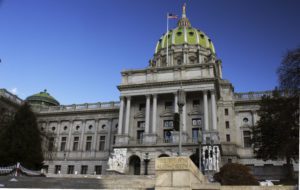
On Friday, Governor Wolf and the Department of Environmental Protection issued a ban on the issuance of water and earth-moving permits and approvals for Energy Transfer pipelines in Pennsylvania.
In response, Joseph Otis Minott, Esq. Executive Director and Chief Counsel of Clean Air Council, issued the following statement:
“The ban on new permits to Energy Transfer is the kind of leadership on pipelines that the public has been waiting for from Governor Wolf. This was a crucial step to protect the public from a company with a track record of environmental destruction, public safety disasters, and deception. The next logical step is to stop the operation of ET’s Mariner East pipelines for good.”
Click here to read the full press statement from Governor Wolf
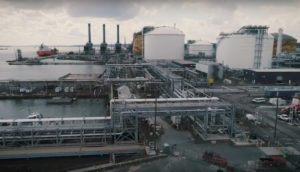
(PHILADELPHIA, PA – January 10, 2019) On Wednesday, the Pennsylvania Environmental Hearing Board (the Board) ruled that the Pennsylvania Department of Environmental Protection (DEP) unlawfully issued an air quality permit for natural gas liquids processing equipment at the Sunoco Partners Marketing & Terminals, L.P. facility in Marcus Hook, Pennsylvania. The processing equipment is designed to handle liquids from the Mariner East pipelines, which run across Pennsylvania. The decision came in response to Clean Air Council’s appeal of Plan Approval 23-0119E in April 2016, leading to a trial in May 2018.
The Board held that the project in question was really part of an overarching project to transform the former Marcus Hook refinery into a natural gas liquids processing facility. The larger project was unlawfully broken up into smaller projects for the sake of permitting. Where separate construction activities are really all part of the same project, the emissions from all of those projects must be aggregated to determine if more stringent requirements are triggered. Ultimately, the Board sent the air permit back to DEP so that DEP can re-evaluate how the project should be permitted.
The Board’s decision enhances existing law by providing detailed guidance on when multiple related projects should be considered one project in a review of an air permit application.
“The Environmental Hearing Board’s decision is not only a victory for Clean Air Council, it is a victory for public health and the neighboring communities,” said Joseph Otis Minott, Executive Director and Chief Counsel for Clean Air Council. “Too often, big industry players have avoided pollution controls by creating loopholes that jeopardize air quality protections. Sunoco/ETP has been one of the worst offenders in this regard, time and again circumventing the rules and putting the public at risk. The Board decision has finally closed this loophole.”
The Board’s opinion is available in full at: http://ehb.courtapps.com/efile/documentViewer.php?documentID=44482
Harrisburg, PA (July 27, 2018) – In a victory for community safety and environmental protection, Clean Air Council, Delaware Riverkeeper Network, and Mountain Watershed Association reached a settlement agreement on Thursday around the Mariner East 2 Pipelines with the Pennsylvania Department of Environmental Protection (DEP). The settlement resolves an appeal of construction-related permits for Sunoco Pipeline L.P.’s (Sunoco) Mariner East 2 pipeline project that has been pending before the Environmental Hearing Board (EHB) for nearly a year and a half.
The environmental organizations reached an agreement with DEP to create and enhance protective policies to address the public health and the environmental impacts from pipeline projects. This agreement will also lead to increased transparency, better access to permit application materials, additional opportunities for public participation, and improved communication with impacted residents along project routes. A new stakeholder group will be created, including environmental organizations, to collaborate on best practices to reduce harms from pipeline construction.
Mariner East 2 consists of two large-diameter pipelines that would carry highly volatile hazardous liquids at very high pressure 350 miles across Pennsylvania to be shipped for sale overseas. In February 2017, Clean Air Council, Delaware Riverkeeper Network, and Mountain Watershed Association appealed DEP’s decision to issue permits to Sunoco to construct the Mariner East 2 pipelines. Within half a year of the appeal, the EHB preliminarily determined that Sunoco’s horizontal directional drilling (HDD) activity imperiled the environment, and it temporarily shut down all permitted activity at every HDD site across the Commonwealth. The groups reached a partial agreement last summer that resulted in significant improvements to Sunoco’s plans for construction of the rest of the pipelines. Nonetheless, when Sunoco was allowed to resume construction, sinkholes opened up in residents’ backyards, and Sunoco’s HDD practices have so far resulted in over 180 separate spills of drilling fluid – an industrial waste and pollutant – into Pennsylvania land and waters.
“This settlement marks the successful resolution of just one part of the many issues with the destructive Mariner East pipelines,” said Joseph Otis Minott, Executive Director and Chief Counsel of Clean Air Council. “There are many other issues that still must be addressed. Due to the negligence and carelessness of Sunoco in constructing these pipelines, opposition to the Mariner East pipelines is accelerating and the Council, its partners, and the many residents that have been harmed by these pipelines will continue to strongly resist them.”
“Sunoco has been among the worst actors in the pipeline industry but they are by no means alone. The mass proliferation of pipelines being allowed to cut through our forests, creeks, private properties, public lands, and communities is inflicting tremendous and irreparable harm,” said Maya van Rossum, the Delaware Riverkeeper and leader of the Delaware Riverkeeper Network. “This agreement is an important step towards protection, but what is really needed is for Pennsylvania to end the practice of fracking for gas from shale in the state.”
“The devastation that Sunoco caused is indefensible and should never have occurred,” said Melissa Marshall, Community Advocate for Mountain Watershed Association. “This settlement is a critical first step towards preventing tragedies such as those we’ve seen with Mariner East 2 from ever happening to anyone again.”
Contact:
Katie Edwards, Clean Air Council
kedwards@cleanair.org, 215-567-4004 x 102
Maya van Rossum, Delaware Riverkeeper Network
keepermaya@delawareriverkeeper.org, 215-369-1188 x 102
Melissa Marshall, Mountain Watershed Association
melissa@mtwatershed.com, 724-455-4200 x 7
PHILADELPHIA, PA (June 14, 2018) — On Thursday, the Public Utility Commission voted to uphold in part and deny in part an order by the Honorable Elizabeth Barnes shutting down the operation of Sunoco’s Mariner East I pipeline and construction of the Mariner East 2 pipelines in West Whiteland Township, Chester County. The Order was in response to a request from State Senator Andrew Dinniman seeking relief for his constituents from ongoing health and safety threats posed by the pipelines. Clean Air Council intervened in Senator Dinniman’s case before the PUC in support of his request and participated in the evidentiary hearing and briefing. Judge Barnes’ order requires a risk analysis and integrity management program to be created to warn and protect the public from danger and to reduce hazards posed by the pipelines. Hundreds of residents and many elected officials reached out to the Commission to express their support for these protections. With today’s vote, operation of Mariner East I will resume, but construction of Mariner East II in West Whiteland Township remains suspended.
“Clean Air Council is honored to be part of the incredible grassroots movement that led to today’s decision continuing the suspension of Mariner East 2 construction in West Whiteland Township, and to support the efforts of Senator Dinniman and the communities who stood up to make this possible. The threats posed by Sunoco’s Mariner East project do not end at the West Whiteland Township line. Communities should continue bringing their concerns to the Commission,” said Joseph Minott, Executive Director and Chief Counsel of Clean Air Council.
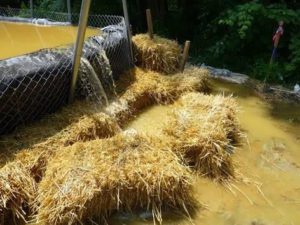
After a slew of legal filings, briefs, and hearings before two different courts, the Environmental Hearing Board, on Monday, April 16th, ordered stronger protocols for responding to and preventing drilling fluid spills on the Mariner East pipelines. Clean Air Council, Delaware Riverkeeper Network, and Mountain Watershed Association took Sunoco and the Pennsylvania Department of Environmental Protection (DEP) to court for violating a previously agreed-upon version of the protocols, and then quietly modifying those protocols without the input of the Council, other organizations, or the court.
The history of these protocols, called the Horizontal Drilling Inadvertent Return Assessment, Preparedness, Prevention and Contingency Plan (or HDD Plan for short) is somewhat complicated. The HDD Plan was originally part of the water permits DEP issued to Sunoco for the Mariner East 2 pipelines in February 2017. In August 2017, after a torrent of drilling fluid spills and drinking water contamination incidents made clear that the February 2017 HDD Plan was failing to protect the public and the environment, Clean Air Council and its partners filed an emergency motion with the court. This resulted in the court shutting down Sunoco’s drilling Mariner East 2 drilling operations until the parties agreed to improvements to the HDD Plan in August 2017. Fast forward six months, and DEP and Sunoco walked back some of those protections in a side agreement. Clean Air Council and its partners filed another emergency filing and have ultimately secured the most protective HDD Plan yet. And this time the stakes are higher if there are further violations.
The new HDD Plan accomplishes several important things. First, it now applies to all drilling methods that could result in drilling fluid spills. Second, professional geologists must be involved in determining whether it is safe to proceed with drilling after a spill. The new HDD Plan lays out specific requirements for what the professional geologist must investigate and present to the DEP. DEP then must find that any plans for continued drilling at the spill site adequately protect the public and the environment before it allows drilling to restart. Groundwater protections have been spelled out in detail so there can be no ambiguity in how they are applied; they are key because of the damage Sunoco’s operations has already caused to drinking water supplies and the continuing nature of that threat. Requirements for notifying DEP and the public about drilling incidents have also been improved.
There will also be increased transparency so landowners and other concerned members of the public will be better able to track any future spills that may arise: Reports prepared by Sunoco’s geologists will be shared with Clean Air Council and its partners. DEP’s documentation of spills on its website will be expanded, made uniform, and include more detail about spill locations–a key piece of information that had previously been missing.
The new HDD Plan is comprehensive, strongly protective, and scientifically rigorous. Perhaps just as important, the Environmental Hearing Board has made it crystal clear that it will not tolerate Sunoco and DEP trying to change it behind the backs of the public again. Even with these improvements, Clean Air Council is under no illusion that the new HDD Plan will be a silver bullet against all future problems and we believe it is still important to keep a watchful eye on construction operations.
You can view the new, April 2018 version of the HDD Plan here
Photo by Faith Zerbe/Delaware Riverkeeper Network
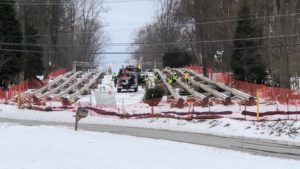
PHILADELPHIA, PA (February 28, 2018) — On Wednesday, Clean Air Council, the Delaware Riverkeeper Network, and Mountain Watershed Association, Inc. filed two new lawsuits against the Department of Environmental Protection (DEP) and Sunoco Pipeline L.P. (Sunoco) for unlawful conduct related to Sunoco’s Mariner East 2 pipelines.
On February 8, 2018, DEP and Sunoco entered into a Consent Order and Agreement that allowed Sunoco to resume construction activities that had been shut down by DEP on January 3, 2018 because of the mounting list of Sunoco’s willful and egregious permit violations. The Consent Order and Agreement walked back environmental protections that DEP and Sunoco had previously committed to in their August 2017 settlement with the groups, and in particular, weakened the protocols for preventing and responding to drilling fluid spills. These spills, most frequently the result of Sunoco’s poor horizontal directional drilling practices, have contaminated drinking water supplies and other natural resources across the state.
The groups appealed the February 8, 2018 Consent Order and Agreement with the Environmental Hearing Board and filed a separate breach of contract complaint in the Commonwealth Court of Pennsylvania, including a request for an injunction.
“It is unacceptable that groups like ours had to force DEP and Sunoco to agree to these important environmental protections in the first place. To walk back legally-required protections now not only violates our agreement, it is an incredible breach of the public’s trust by an agency that is supposed to be serving them,” said Joseph Otis Minott, Esq., Executive Director and Chief Counsel of Clean Air Council.
“When DEP halted construction of Mariner East 2, it seemed like they were finally listening to the concerns of impacted residents and communities. However, by allowing construction to resume and scaling back hard-fought environmental protections, DEP leaves us no other choice but to take legal action yet again to protect citizens’ rights,” said Melissa Marshall, attorney with Mountain Watershed Association.
“DEP has demonstrated a tremendous bias in support of pipelines serving the fracking industry. As a result, communities are being consistently abused by the industry with the full support of the DEP. DEP entering into an agreement with Sunoco that ignores their obligations to our organizations and the communities we represent, is a sad testament to just how in bed with the industry DEP is,” said Maya van Rossum, the Delaware Riverkeeper and leader of the Delaware Riverkeeper Network.
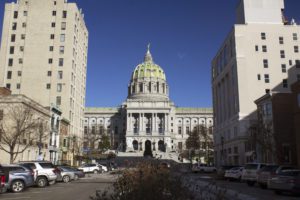
FOR IMMEDIATE RELEASE:
December 14, 2017
Contact:
Justin Wasser, Clean Air Council: 814-242-3156
Impacted Residents, Health Experts and Environmental Advocates Urge Gov. Wolf to Advance Methane Pollution Standards for the Natural Gas Sector
Harrisburg, PA (December 14, 2017)- The Pennsylvania Department of Environmental Protection (DEP) presented today the final draft of permits to control methane pollution from new and modified natural gas operations to the Air Quality Technical Advisory Committee (AQTAC). Residents affected by natural gas operations, as well as environmental and public health advocacy groups from across the Commonwealth, spoke at a press conference and at the AQTAC meeting during the public comment period. The comments were a continuation of advocacy that has spanned three years urging Governor Wolf to fulfill his campaign promises on methane controls. Wolf first promised to cut methane pollution from all new and existing gas operations on the campaign trail in 2014. He announced his methane reduction strategy in January 2016.
Environmental and public health advocacy groups and impacted residents were pleased to finally see progress made on the methane reduction plan at the meeting, but say that the Wolf administration must quickly finalize general permits and require companies to comply with them. Groups raised concerns about the administration’s proposed concepts for weaker rules covering existing source of methane pollution — a major departure from what the governor promised to do.
“While the progress being made on methane standards covering new natural gas sources is encouraging, the Wolf administration must move quickly to regulate existing sources in a similar way,” said Joseph Otis Minott, Executive Director and Chief Counsel of Clean Air Council. “What DEP is proposing to implement on existing sources is the bare minimum required by law. Governor Wolf must go well beyond the bare minimum in protecting the health of Pennsylvania citizens. We elected this governor based on his promises to be a leader in addressing methane pollution and climate change. Pennsylvanians deserve that leadership.”
Methane, a very potent greenhouse gas, is accompanied by air pollutants harmful to human health when it leaks from natural gas operations. Emissions in Pennsylvania continue to rise year after year.
The standards for new and modified sources will be implemented through two general permits, which allow for a streamlined approval process if industry operators agree to adhere to the permit conditions. One permit, GP-5A, covers unconventional gas wells and pigging operations and the other, GP-5, covers processing plants and compressor stations, including those on large transmission pipelines.
“Comprehensive methane rules for existing sources of pollution must be broader in scope and more stringent than the requirements found in EPA guidelines,” said Robert Routh, staff attorney for Clean Air Council. “These guidelines represent the national floor. Governor Wolf and DEP need to lead here and aim much higher for the sake of all Pennsylvanians.”
“The citizens of the commonwealth are suffering needlessly when we have the tools and technology available to greatly limit methane pollution and help clean our air,” said Dr. Robert Little, a family physician and president of the Harrisburg/Hershey chapter of Physicians for Social Responsibility. “It bears emphasizing that we need to clear our air of both toxic hydrocarbons and emissions of methane – reducing one kind of pollution without the other gets us nowhere.”
“Until these new source rules are applied to existing sources, people in my community and others dealing with methane pollution right now are still looking at an unfulfilled promise by Governor Wolf,” said Lois Bower-Bjornson, an impacted resident of Washington County, PA. “I am urging Governor Wolf to be that leader who campaigned on a promise of holding the natural gas industry accountable to the people of Pennsylvania and move forward on rules for existing sources of methane pollution and VOCs immediately.”
“Today, my children and 3,200 of their classmates are attending school next to a gas well pad roughly half a mile away exposing them to a known health and safety risk from oil and gas air pollution including emissions of methane and volatile organic compounds,” said Patrice Tomcik, a mother of two sons from Butler County and a Field Consultant with Moms Clean Air Force, a 1 million member strong organization. “Let’s be clear: This problem will not be resolved unless and until DEP addresses these toxic pollutants like benzene, as well as methane emissions.”
